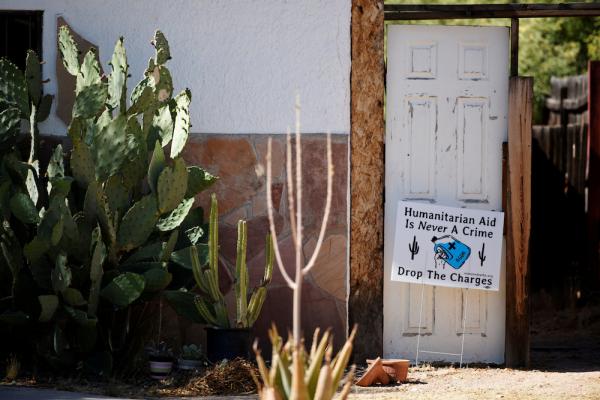An Arizona jury on Wednesday found a human rights activist not guilty of harboring two migrants who crossed the U.S.-Mexico border illegally, after the U.S. government prosecuted him for giving them food, water, and shelter in the desert.
The Tucson jury took just over two hours to acquit Scott Warren, 37, after they were tasked to decide whether the geography professor provided the men with legal humanitarian aid in January 2018, or deliberately concealed them from U.S. Border Patrol.
An overjoyed Warren hugged supporters who stuck with him through two federal trials this year, after a previous jury was unable to decide whether he broke the law by letting the men stay in a building near Ajo, Arizona, to recover from a desert trek.
"I love you all," Warren told his defense team and members of his group No More Deaths, which leaves water in the desert for migrants. "To those in the desert working on water drops and other aid, I love you too."
Warren's case drew the support of United Nations officials and Amnesty International who said he was being persecuted for providing aid in the midst of a humanitarian crisis on the U.S.-Mexico border.
Federal prosecutors accused Warren of shielding the men from the U.S. Border Patrol and giving them directions while they stayed at the ramshackle wooden building known as "The Barn" from Jan. 14-17, 2018.
The case was seen as an indicator of what assistance U.S. humanitarian workers, doctors, and even employers can give to undocumented immigrants as President Donald Trump makes tougher immigration enforcement a major re-election theme.
"We are so grateful that Scott Warren is free," said Juanita Molina a Tucson human rights activist who runs the group Border Action Network. "Criminalizing humanitarian aid is against our values as a community."
Warren was arrested on Jan. 17, 2018, at the building in desert around 103 miles west of Tucson, where U.S. prosecutors accused him of concealing Kristian Perez-Villanueva, then 23, and Jose Arnaldo Sacaria-Goday, 20.
The men from El Salvador and Honduras, respectively, crossed the border and walked nearly 30 miles through the desert before sheltering in the building used as an aid station by NMD and other groups.
Warren gave the men medical checks, finding they both had blisters and scratches, with Sacaria-Goday showing cold-like symptoms and complaining of a bruised upper torso.
He said the men needed to recover rather than continue their journey through desert where "people are dying from exposure."
Since 2001 the Pima County Office of the Medical Examiner has identified more than 3,000 sets of human remains suspected of belonging to migrants who died in the deserts of southern Arizona.
Got something to say about what you're reading? We value your feedback!





